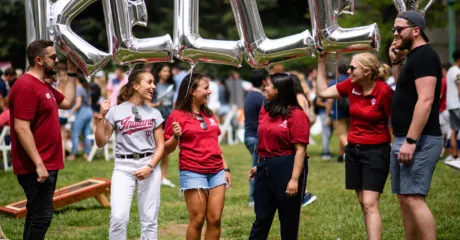The Foster School of Business at the University of Washington in Seattle rose 5 places in this year’s 2023 rankings, coming in at No. 19 relative to last year’s No. 24 place. This marks the B-School’s first time ranking in the teens, as they usually remain in the low 20s.
Of the three methodological categories, the B-School scored highest in the Admissions category, placing 20th. They saw the greatest change in acceptance rate compared to any other B-School this year – jumping from a 20.98% rate for last year’s incoming class to an incredibly selective rate of 8.50% for this year’s incoming class.
In terms of employment outcomes, the Foster School performs very well. For the second year in a row, 97% of the Class of 2023 landed at least one business-focused internship before graduation. Further, 94.92% of the Class of 2023 secured a full-time position within three months of graduation — slightly under last year’s 97% rate. Graduating seniors reported an average starting salary of $77,005.
A “TWO-YEAR” BUSINESS EDUCATION
The Foster program is best characterized by a quality curriculum that emphasizes group work and an abundance of resources and opportunities for students to apply their knowledge in the real world.
Foster is technically a two-year undergraduate business program, with standard admission to the B-school taking place at the end of sophomore year once a student has been admitted to UW. Although students have the option to apply as a direct admit as a freshman applicant, which continues to be an increasingly popular path to the school.
Admitted students can choose from the following business majors: accounting, entrepreneurship, finance, general business, human resources management, information systems, marketing, and operations and supply chain management.
Additionally, Foster also offers a Certificate of International Studies in Business (CISB), a rigorous and integrative supplement to its business degree. CISB students take part in study abroad, foreign language immersion, and area studies coursework.
For ambitious students, the Fosters Honors Program offers an intensified academic experience with opportunities for research and class-based projects, honors sections, and greater access with researchers and practitioners. Honors students graduate from the Foster School “With Distinction.”
All Foster business students need to complete 72 business credits, of which a minimum of 53 need to be upper division. Additionally, because the B-school requires a large portion of the curriculum come from upper division courses, many of the classes that Foster students take require a group project and presentation.
HIGH-QUALITY RESOURCES, CASE COMPETITIONS, AND CAPSTONE PROJECTS
Where Foster really shines as a B-school is in its opportunities for students to apply their studies to real-world situations. Foster is home to six state of the art centers that drive innovative research and enable students to gain real-world, hands-on experiences. Foster centers include Consulting and Business Development, Buerk Center for Entrepreneurship, Global Business Center, Center for Leadership and Strategic Thinking, Center for Sales and Marketing Strategy, and USTC-UW Institute for Global Business and Finance Innovation.
Additionally, Foster hosts a number of case competitions that allow students the opportunity to solve real-world problems, join a team, network with business leaders, and collaborate with peers in an intense team-driven environment.
Alumni say:
“Part of the capstone was managing and growing a virtual company which provided great experience to apply many things we have learned. The other part of the class was a case competition where we evaluated Barefoot Wines and did consulting work for them. This was a very exciting way to apply what we’ve learned and be evaluated by it.”
“I was part of the Certificate of International Studies in Business (CISB) program which I think may be the premier program offered by Foster. This program offers a degree in a business focus while also requiring its members to study 3+ years of a foreign language. You then go study abroad in a country that speaks said language and you take your classes in the native tongue instead of English for full immersion. Without a doubt this program pushed my comfort zone and provided excellent global perspectives, not to mention the opportunity to really improve my language skills.”
“My marketing management class was run like a consulting class, and it was so beneficial to my education to get to work closely and hands-on with a local Seattle company! We were able to develop and present an in-depth business strategy to this company (that they then implemented!), and it was a great learning experience to analyze real business documents (e.g. financials) and then develop and present strategic marketing, finance, and business operations recommendations that we knew would have real-world implications.”
“The capstone project allowed us to evaluate a real issue that a company was faced with and encouraged us to think diligently and creatively to resolve it.”
“The teachers I had were incredible. They made my experience worth it and taught me how to work with adults. Being a young financial advisor, I have the skills necessary to speak with people much older than me and to have intellectual conversations.”










